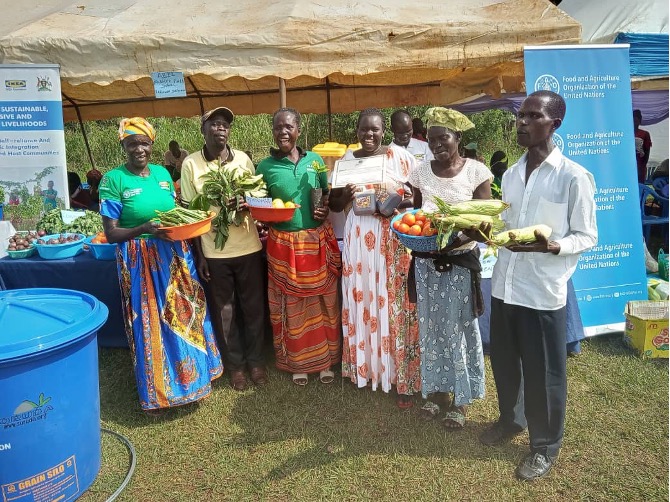Farmers from Panyadoli refugee settlement exhibit their products.
By Peace Nakitto, Nutrition, Gender & WASH Advisor, Self Help Africa Uganda
World Refugee Day is observed on 20 June each year. It’s a day to commemorate the strength, courage and perseverance of millions of refugees worldwide. World Refugee Day raises awareness of the rights of refugees and highlights the plight of those fleeing conflict, violence or persecution. This year’s theme is ‘For a world where refugees are welcomed’.
The displacement crisis
Violence, conflict and persecution continue to displace tens of millions of people globally. Increasingly, climate change is worsening other displacement factors, such as poverty, loss of livelihoods and resource-related tension.
Uganda has the largest refugee population in sub-Saharan Africa and the sixth largest in the world. More than 1.6 million people have sought safety here, primarily from South Sudan, the Democratic Republic of the Congo (DRC) and Burundi.
Our commitment to refugees
Self Help Africa works with refugees in Uganda’s Adjumani and Kiryandongo settlements. We believe that offering sanctuary and protection to those who have fled violence reflects our shared humanity.
Beyond offering a warm welcome, at Self Help Africa we strive to provide refugees with opportunities to thrive – using their talents, skills and passions to support their families, earn a living, and contribute to their local communities. We achieve this through various projects working with refugees and their host communities towards a better future for all.
Our five–year strategy in Uganda commits to ‘specific initiatives aimed at refugees and their host communities’. This reflects the wider Self Help Africa vision of sustainable livelihoods and healthy lives for all, from fragile contexts through to emerging economies.
Refugees are at increased risk of undernutrition and food insecurity. Women and girls living as refugees face additional specific challenges too. Through my role as Advisor across the areas of Gender, Nutrition and Water/Sanitation, I am committed to ensuring our programmes address these areas – working in partnership for maximum impact.
Below are a few examples of our programmes working to change the lives of refugees in Uganda for the better:
Our strategy in action: Working with refugees in Uganda towards a brighter future
In partnership with the UN World Food Programme (WFP), we support smallholder farmers in refugee and host communities in Adjumani and Kiryandongo – particularly women and young people – to sustainably increase their food production, improve their nutritional intake and secure an income. In Kiryandongo refugee settlement, we work with the UN Food and Agriculture Organization (FAO) to do likewise, including by providing business development services to refugee and host community households and promote sustainable water systems for climate-sensitive farming.
Meanwhile, in Adjumani and with Irish Aid support, Self Help Africa is working with low-income farming households to improve their access to and consumption of sustainable, diverse and nutritious food. These farmers are also enhancing their sustainable and resilient farming practices and business development skills with our support. A pilot project with WFP also enabled refugee families to sell produce back to the UN agency, supporting their procurement of food supplies for 1.3 million refugees in Uganda. This project encouraged self-reliance by working with refugees to produce nutrition-rich foods like orange-flesh sweet potato and iron-rich beans, which also have local market demand.
These projects, alongside other Self Help Africa projects, have made farming a more viable livelihood for refugees, equipping them with the knowledge and skills needed to build sustainable livelihoods and a brighter, independent future.
Peace Nakitto Jjagwe provides technical expertise in the fields of Nutrition, Gender and WASH across Self Help Africa’s programmes in Uganda. Peace plays a pivotal role in programme development and the delivery of high-quality programmes, and is committed to promoting learning and innovation within Self Help Africa and across our partnerships.

